Avaliação do Programa Nacional de Alimentação Escolar na educação profissional: triangulando indicadores no IFRN e no IFSULDEMINAS

Visualizar/
Data
2017-08-29Autor
Santos, Giselle Rodrigues dos
http://lattes.cnpq.br/5703948604725347
Metadado
Mostrar registro completoResumo
The National School Meal Program is considered the main food program in Brazil and it is a public policy recognized as one of the most relevant and long lasting. Due to its recent implementation in the Federal Network of Professional, Scientific and Technological Education, a study was carried out with the objective of evaluating the implementation process of this Program within the framework of Instituto Federal de Educação, Ciência e Tecnologia do Rio Grande do Norte (IFRN) and Instituto Federal de Educação, Ciência e Tecnologia do Sul de Minas Gerais (IFSULDEMINAS), focusing on the social indicators foreseen by the Program (2009- 2016). It was used for the research a type of evaluation called evaluation by triangulation of methods, having as a matrix the dimension of School Feeding analysis accompanied by its respective variables, a map of indicators observing its desirable properties and instruments. Interaction with regional family farmers and the purchase of family agriculture were easier actions for the southern Minas Gerais Institution, due in part to their long history related to agricultural science courses. There is also a better interaction between the sectors of this institution due to the commissions that were set up for the execution of public calls. As a rule, educational data are better described in IFSULDEMINAS than in IFRN and even in relation to national averages. In the campus where there is no technical responsibility for the Program, whether in the IFSULDEMINAS or in the IFRN, the educational dimension, carried out by the actions of food and nutritional education, is not or is sporadically executed. IFSULDEMINAS also presents a better management of the funds provided by the FNDE in relation to the IFRN, since it presents a lower percentage than the second one regarding the devolution of resources to the Ministry of Education, taking into account all the historical series researched: 8.6% for the South Minas Gerais Institution against 10.08% for the potiguar. Although the socioeconomic profile of the IFSULDEMINAS students is more favorable than that of the IFRN students, the supply of meals through the PNAE is greater in the first one, leveraged by the significant contribution of the school farms in the campus that have a productive unit. Finally, these Institutions, despite emphasizing the integral formative aspect of the student, do not implement the Program relating it to the different dimensions of the student's life.



